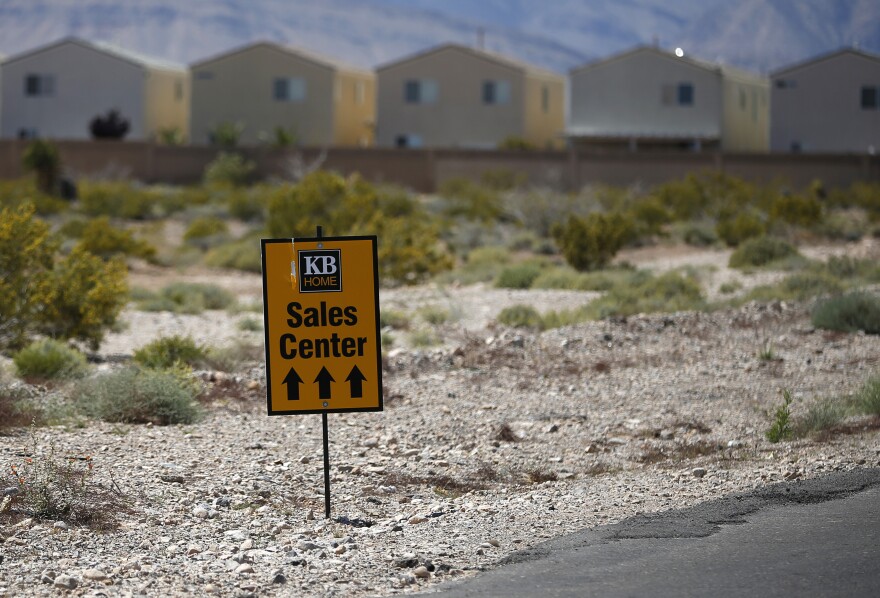Buying a home is one of the biggest purchases most people will make in their lives.
Over the last few years, people have been paying a premium for homes in Nevada —many times bidding way more than the asking price; sometimes having to get into a lottery just for the chance to make a bid.
Then the Federal Reserve raised interest rates as a way to fight inflation. The cost of getting a home mortgage rose, and home prices have fallen.
According to the National Association of Realtors, sales have fallen by about 35% since last year. So now, prices are going down and housing stock has increased.
Lee Barrett is the 2023 president of Las Vegas Realtors. He’s said that buyer confidence is going down, despite dropping home prices.
“I hate to say a perfect storm,” he told State of Nevada host Joe Schoenmann on Thursday. “But it’s an opportunity that they’re not looking at. The sophisticated buyer will pay attention to this market; the person that’s concerned and afraid will miss out because as the prices drop, there’s going to be opportunity there.”
In 2012, the median home price was $113,000, he said, and now those homes are worth three times as much. So what about 2023?
“If I had a crystal ball, I'd be a very wealthy man. … In 2004, we had almost two weeks’ worth of inventory. And so on January 1, the market went insane. In six months, we had 58.7% appreciation of value. You just never know. I think interest rates stabilizing will get people back in the market. And I think honest conversations like this will help people go, ‘okay, maybe I need to do this,’” he said.
Nevada now has about four to six months of housing stock available, which Barrett considered a balanced market. (A seller’s market would be one to three, and a buyer’s market would be above six months.)
“I think that we’re going to see some creative buyers come in from California that have maybe faced the same thing in California with values, and they’re going to probably be more negotiable,” he said.
Shanta Patton-Golar is the director of the National Association of Real Estate Brokers. She suggested two home-buying assistance programs, including Home First and Home is Possible.
“You have to go find the money because there is no way for you to be able to save at a $75 rate to get homeownership,” she said. The programs are designed to keep Nevadans home and help them purchase property. “It’s not for investors.”
An average mortgage in Nevada today comes with a 30-year fixed rate of 6.27%. Jonathan Gedde with Simplifi Mortgage said he sees these rates as a return to normal.
“And that includes the home price. We had a couple of years in a row of extremely high home appreciation, double digit 10, 20, 25% increases in home values per year. That's not sustainable. And it's not a normal market when things like that happen. So taking a little pause, coming back to earth a little bit on home prices, as we've seen since the peak in May, is a very healthy thing,” he said.
However, a few issues persist for first-time homebuyers, such as discrimination in lending.
“If that bank does not get your business and you go somewhere else,” Patton-Golar said, “go somewhere else. Do not allow the first no to be the only no that you get. … Realtors are still discriminating. We have a great president focused on diversity and inclusion, so we are paying attention to everything; we will manage our own people.”
She continued, “For those in the community, if you do not feel comfortable, there is always another bank, another realtor or someone else who has … your interests in mind.”
She said it’s time for buyers.
“You have been taking Ls for years, now is your time,” she said. She told buyers to give their best offer, and noted that with homeownership, the price can’t get worse, as opposed to rent which can rise.
The housing market has had an impact on business throughout the state, said John Restrepo, the principal with RCG Economics.
“If we’re more expensive than, let’s say Phoenix and Salt Lake, then those companies that are thinking of expanding here may opt to go to other latinos, particularly if they have better workforces.”
He noted that we’re not in a recession, and economic trends are global currently.
“It’s difficult to say at this point, but there is going to be some level of correction,” he said. “What’s happening is, the good news is the job market is still pretty tight. … What the general consensus is with most economists is that we're probably going to see a recession, similar in depth to what we saw in the dot-com crisis in early 2000s. Not anything like the Great Recession.”
Guests: Shanta Patton-Golar, director, National Association of Real Estate Brokers, real estate broker, Patton & Associates Real Estate Group; Jonathan Gedde; founder and CEO, SimpliFi Mortgage; Lee Barrett, president, Las Vegas Realtors; John Restrepo, principal, RGC Economics








